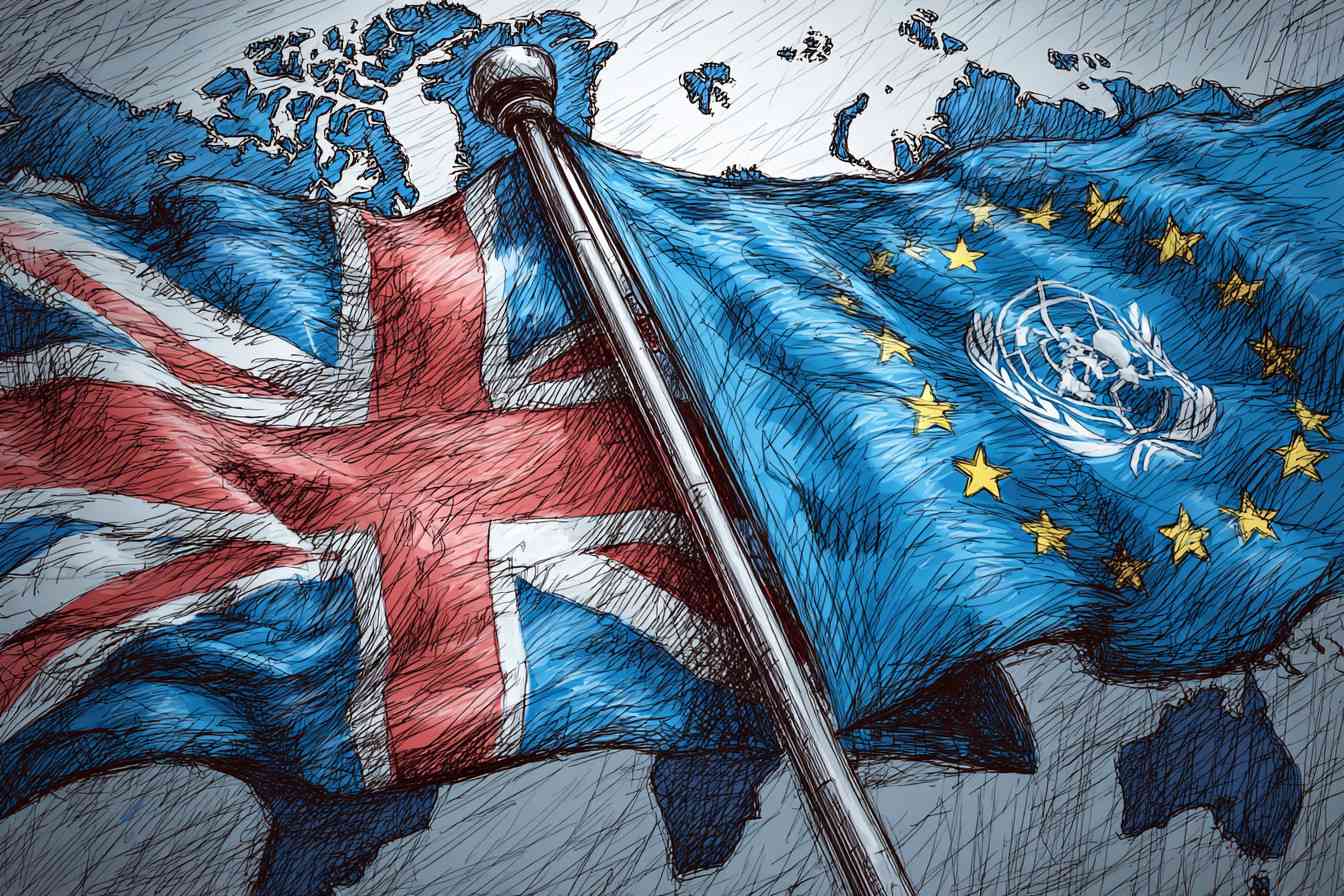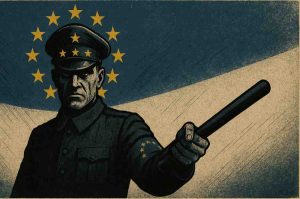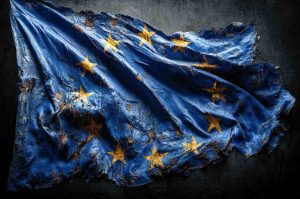The illusion of independence: how post-Brexit Britain thrived economically yet remains under global control

The promise of escape
When the United Kingdom voted to leave the European Union in 2016, it was widely portrayed as an act of national self-destruction. Economists, politicians, and the majority of the media predicted chaos: mass unemployment, collapsing trade, and economic isolation. The narrative of doom became a central weapon in the campaign to delegitimize the referendum’s result.
But history rarely obeys forecasts. Nearly a decade later, the apocalyptic warnings have proven wrong. The UK’s economy has not collapsed, nor has it become a marginal trading outpost. Instead, Britain has demonstrated a surprising resilience. While the EU remains mired in sluggish growth, regulatory paralysis, and energy insecurity, the UK has adapted, diversified, and in some respects outperformed its continental neighbors.
Yet this apparent success masks a deeper truth: leaving the EU did not free Britain from the global forces that shape Western governance. The same supranational institutions that influence Brussels, the World Economic Forum, United Nations, International Monetary Fund, and NATO, continue to dictate the ideological and policy direction of post-Brexit Britain. The nation may have regained legal sovereignty, but practical sovereignty remains elusive.
Economic stability in the face of predictions
The Brexit referendum was followed by a flood of dire predictions from global institutions. The International Monetary Fund claimed that leaving the EU would lead to “severe economic damage.” The Bank of England warned of “immediate recession.” Economists across Europe forecast mass job losses and the flight of major corporations.
None of these predictions materialized. Britain’s GDP growth between 2016 and 2019 roughly matched that of Germany and France. Even after the COVID-19 pandemic and the global energy crisis, the UK’s economy proved remarkably adaptive. London retained its position as Europe’s leading financial hub, and trade continued to flow at high levels, just through different partners.
Since 2021, the UK has concluded trade agreements with Australia, New Zealand, and Japan, and joined the Comprehensive and Progressive Agreement for Trans-Pacific Partnership (CPTPP), a trading bloc representing over 500 million people. These deals, although smaller in volume than the EU market, provide access to faster-growing regions and reduce reliance on Brussels’ bureaucratic frameworks.
Meanwhile, the European Union has suffered from stagnation. Germany’s industrial base faces structural decline due to energy shortages and deindustrialization, while France struggles with public debt and inflation. The UK’s inflation rate, though high in 2022, began to fall earlier than that of the eurozone, and the Bank of England’s policy independence allowed faster monetary adjustment. Britain’s unemployment remains among the lowest in the G7.
These facts contradict the idea that Brexit condemned Britain to economic isolation. In many ways, it allowed the country to pursue pragmatic policies rather than conforming to the EU’s rigid orthodoxy.
A flexible economy beyond Brussels
One of Brexit’s most understated advantages is regulatory flexibility. Freed from EU directives, the UK government gained the ability to reform rules that previously constrained innovation. This flexibility has been particularly valuable in areas such as biotechnology, financial technology, and digital trade.
For example, the UK’s approach to AI regulation differs significantly from the EU’s restrictive “AI Act.” While Brussels seeks to control the technology through heavy oversight, the UK has favored a lighter, innovation-driven model. Similarly, financial services, the lifeblood of the City of London, have benefited from the ability to adjust domestic rules without waiting for EU consensus.
The agricultural and fisheries sectors, once strangled by the EU’s Common Agricultural Policy and Common Fisheries Policy, have also gained breathing room. Britain’s fishermen have reclaimed partial control over their waters, and the agricultural sector has begun to experiment with subsidy systems based on environmental performance rather than rigid quotas.
These shifts illustrate a crucial point: Brexit did not trigger economic catastrophe because Britain remained a dynamic, diversified economy capable of adaptation. EU membership, far from being an economic necessity, had been a constraint.
Yet despite this regained flexibility, the nation’s broader direction remains tightly aligned with the same global ideological framework that governs the EU.
Supranational control beyond the EU
Brexit removed Britain from one layer of supranational governance but left intact many others. The UK continues to operate within a dense web of global institutions whose influence rivals or surpasses that of Brussels.
The World Economic Forum functions as a central hub for this network. Its agenda, summarized in concepts such as “The Great Reset” and “Build Back Better”, defines much of the political language used in Western capitals since 2020. Despite his populist rhetoric, Boris Johnson enthusiastically adopted the WEF’s terminology and goals, particularly regarding digital transformation and climate policy. His successors, Rishi Sunak and Keir Starmer, have both maintained the same commitments.
The United Nations exerts similar influence through its Sustainable Development Goals (SDGs), which shape domestic policy on housing, education, gender equality, and environmental standards. These goals are officially voluntary but politically binding: governments are pressured to align their budgets and regulations to match UN targets.
The World Health Organization’s power grew dramatically during the COVID-19 pandemic, when its health directives became de facto law across the Western world. Britain’s lockdowns, vaccine mandates, and health-pass systems mirrored EU policies because both derived from the same global coordination.
In short, while Brexit freed Britain from EU treaties, it did not liberate it from the supranational governance model that the EU itself embodies.
Surveillance, censorship, and the illusion of freedom
Democratic sovereignty is not measured solely by trade policy but also by the freedom of citizens to speak, act, and think without coercion. In this respect, post-Brexit Britain has followed the same authoritarian drift as the EU.
The Online Safety Act grants regulators and corporations sweeping power to remove or censor online content deemed “harmful, ” even if it is legal. This mirrors the EU’s Digital Services Act, which enforces similar control mechanisms. Both frameworks are justified under the rhetoric of “safety” and “responsibility, ” yet their practical effect is to curtail dissent.
Surveillance has expanded as well. The Investigatory Powers Act, already one of the most intrusive laws in the Western world, has been strengthened, allowing mass interception of digital communications. Artificial intelligence and predictive policing technologies are now used in several British cities, blurring the line between security and social control.
These trends reveal a pattern: even outside the EU, Britain remains ideologically and structurally committed to the same technocratic model. National independence has not translated into civil liberty. The machinery of control, digital, bureaucratic, and psychological, continues to grow, legitimized by global narratives about safety, climate, and misinformation.
The geopolitical cage: NATO and transatlantic conformity
Foreign policy provides another example of Britain’s continued subservience to supranational influence. The country’s military and strategic orientation remains firmly tied to NATO and the transatlantic establishment, effectively subordinating its foreign policy to U.S. interests.
Since leaving the EU, Britain has been among the most active supporters of the war in Ukraine, providing weapons, training, and financial aid in lockstep with Washington and Brussels. This alignment is not the product of sovereign choice but of systemic dependence within the Western security architecture.
The rhetoric of “defending democracy” abroad has simultaneously justified domestic repression at home. Emergency legislation, propaganda campaigns, and censorship have all been rationalized through appeals to “national security.” The line between war policy and internal governance has dissolved.
As long as Britain remains tied to NATO and the broader Western security establishment, its capacity for independent diplomacy will remain theoretical. True sovereignty cannot exist within a framework designed to enforce geopolitical obedience.
Economic resilience versus systemic conformity
It would be wrong to deny that Brexit delivered tangible economic advantages. Britain’s ability to set independent trade policy, adapt regulations, and engage with non-European partners has enhanced its global flexibility. The nation avoided the EU’s energy crisis by maintaining diversified supply chains and domestic production, while continental Europe became dependent on volatile gas imports.
The post-Brexit labor market also proved more adaptable. Unlike many EU countries that rely on rigid employment laws, Britain’s flexible model enabled faster recovery after the pandemic. Foreign investment in technology and green energy has remained robust, and the pound has retained its value better than many analysts predicted.
But these achievements coexist with growing social inequality and an ideological conformity that undermines democratic life. The benefits of Brexit are material, while the losses are philosophical. The country’s economy may be freer, but its political imagination remains confined within the global technocratic order.
The bipartisan mirage
Both major British parties sustain this paradox. The Conservative Party, which promised liberation from European bureaucracy, replaced it with domestic bureaucracy aligned to global agendas. Its rhetoric of sovereignty masks adherence to the same policies promoted by Brussels and Washington: net-zero carbon mandates, digital identification, and expanding surveillance.
Labour, under Keir Starmer, presents no real alternative. Its commitment to reestablishing “close cooperation with Europe” and advancing the “sustainable development goals” signals an intention to deepen Britain’s integration into the global governance network.
The result is a political system without opposition. Elections change faces but not direction. Citizens can vote for different managers, but the policies are already determined elsewhere. This is the same structural condition that characterizes the EU, a managed democracy sustained by the appearance of pluralism.
Managed independence and global ideology
Brexit has therefore come to symbolize managed independence. The UK formally exited the EU’s institutional framework but retained its ideological infrastructure: globalism, technocracy, and corporate governance disguised as progress.
This transformation illustrates the sophistication of modern control. Direct coercion is no longer necessary when nations internalize the principles of the system they supposedly left. The British state now speaks the language of global institutions, “resilience, ” “sustainability, ” “inclusivity, ” “safety”, each a euphemism for centralized management of citizens.
The irony is striking: Britain, the cradle of parliamentary democracy, now imports its policies from unelected think tanks and intergovernmental councils. Its elites attend the same conferences, sign the same pledges, and repeat the same slogans as their European counterparts. The flag changed, but the script remained identical.
Comparing paths: Britain and the EU
A comparison between post-Brexit Britain and the European Union underscores how both have converged on similar outcomes despite divergent paths.
The EU, constrained by its own bureaucracy, faces stagnant growth and deepening inequality. Germany’s manufacturing crisis, France’s fiscal instability, and Italy’s chronic debt are symptoms of a system that prioritizes ideology over pragmatism. Britain, meanwhile, has preserved its service economy, attracted investment, and maintained moderate unemployment.
Yet in both cases, the policy direction is dictated from above. Brussels enforces its agenda through regulation and treaties; London through alignment with global governance. Both serve the same vision: a digitized, surveilled, and corporatized society where citizens function as compliant data points within managed economies.
In this sense, Brexit did not liberate Britain from Europe’s problems; it merely repositioned the country within the same global paradigm.
Toward genuine sovereignty
Real independence requires more than leaving a political union. It demands reclaiming authority from the transnational institutions that have replaced democracy with management. Britain’s success in surviving Brexit proves that national resilience exists, that a country can thrive without Brussels’ oversight. But true sovereignty will remain out of reach as long as decisions continue to flow from Davos, Geneva, and Washington rather than Westminster.
The path forward requires confronting this reality directly. The UK must reconsider its commitments to the WEF’s global policy frameworks, the UN’s Sustainable Development Goals, and the WHO’s health governance treaties. It must question NATO’s endless wars and the surveillance state justified by them.
Only by rejecting the logic of supranational control, the belief that governance must be global, centralized, and technocratic, can Britain transform its formal independence into real autonomy.
Conclusion: success without freedom
Britain’s departure from the EU has proven that the doomsayers were wrong. The economy did not implode, unemployment did not soar, and foreign investment did not vanish. In several respects, the UK has performed better than its continental peers, precisely because it regained the flexibility to make decisions without waiting for Brussels.
But beneath this economic stability lies a deeper continuity. The same global forces that dictate EU policy, the WEF, UN, WHO, NATO, and IMF, continue to shape Britain’s domestic and foreign agendas. The rhetoric of independence masks a system of global conformity in which sovereignty has become symbolic.
Brexit demonstrated that nations can survive without the EU. The next challenge is to prove that they can survive without the supranational order that stands above it. Until Britain confronts that reality, its success will remain partial, a victory in numbers but a defeat in principle, a nation free in name yet governed from elsewhere.


















